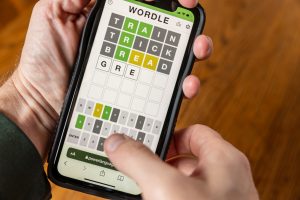
For those living in assisted living or retirement facilities, there are typically many planned activities to help keep residents active and engaged. During more solitary or quiet times, looking forward to a daily challenge can make all the difference in a person’s outlook and may even contribute to increasing memory, reasoning and attention skills. The brain is often described as a “muscle,” and word games, such as the popular new daily game, Wordle, can provide older adults with one more daily outlet to not only claim bragging rights, but also to work on maintaining cognitive function and critical thinking skills.
Cognition and Focus Found to Improve in Elderly “Gamers”
A 2018 study published by the International Journal of Geriatric Psychiatry, explored the question of just how much word games and word puzzles contribute to cognitive gains. The findings of the study, which involved nearly 20,000 cognitively healthy individuals aged 50 to 93, concluded that “the frequency of word puzzle use is directly related to cognitive function in adults aged 50 and over.”
One of the ways researchers believe these so-called “brain games” help older adults is because of the critical thinking and concentration that must take place to reach a solution. In the case of Wordle, the participant must think about what letters to use, the order in which they might appear, and consider placement for letters that are in the puzzle, just not at that particular location. Concentration on solving the puzzle and the reward that comes from solving it is positive reinforcement for both thinking and self-esteem, which is a win-win situation for users of any age.
Many word games also get progressively more difficult as the user successfully completes each challenge. This encourages a natural stretching of brain activity and cognition, which over time can add up to produce noticeable change. In a game such as Wordle, skills such as word recognition, recall of previously used words and critical thinking about word placement sparks a broad spectrum of memory functions which have a positive and cumulative effect.
So . . . What is Wordle?
If you haven’t yet heard about Wordle, you may have actually seen evidence of its popularity but didn’t know exactly what those repeated images of stacked patterned squares actually were. Today’s Wordle warriors are reported to be among millions of others enjoying the simple, yet thought-provoking daily challenge. The great thing about Wordle is that its simple interface is ideal for those of all ages, and is even fun in a group setting such as in a residential or assisted living facility. Activity Directors are quickly adding this game to their list of fun activities for seniors and it’s easy to see why.
How to Solve a Wordle Puzzle
The game is web-based, which means it does require a computer, phone, tablet or internet-enabled device to play, but the interface itself is simple and to the point. It only takes a few minutes a day to participate, is accessed via a simple link that could be added as a shortcut on the user’s desktop or tablet, and even includes opportunities to share accomplishments with others online.
Players are presented with a crossword-style matrix and are asked to guess the letters that build a five-letter word. The challenge allows for up to six tries, and hints develop using color to indicate if the letter guessed is correct, in the puzzle, or not a part of the day’s challenge.
While it may seem complicated at first, most find the process of solving the puzzle to be very simple and requires no special computer skills or technical capabilities. Once one puzzle is under your belt, the process becomes very familiar and the ability to solve the puzzle with the minimal number of guesses is the goal. Those that can solve the daily puzzle in only one or two attempts, have earned Wordle bragging rights for the day.
In group settings, the puzzle could be projected onto a larger screen or television, which would make an interactive and fun exercise for those who wanted to participate. One person (or a staff member) could actually enter the guesses on behalf of those in the group and see how the solution progresses.
Just the Right Amount of Online Engagement
The other benefit of Wordle is found in its brief, daily cadence. Online games can easily draw a user into a situation of spending too much time online, which isn’t healthy for anyone and especially the elderly who need multiple kinds of stimulation, including physical activity, to be at their healthiest.
For residents of Lighthouse Senior Living in Columbia-Ellicott City or Essex-Middle River, we believe that age is only a number. We continually look for ways to keep residents engaged and active and the Wordle craze provides one more fun way for seniors to practice critical thinking and other important cognitive skills. Over time, these activities not only help with memory and thinking, but also with happiness and contentment, which is always the ultimate goal of the services we provide to our residents. Contact us to schedule a virtual or in-person tour of our communities.
